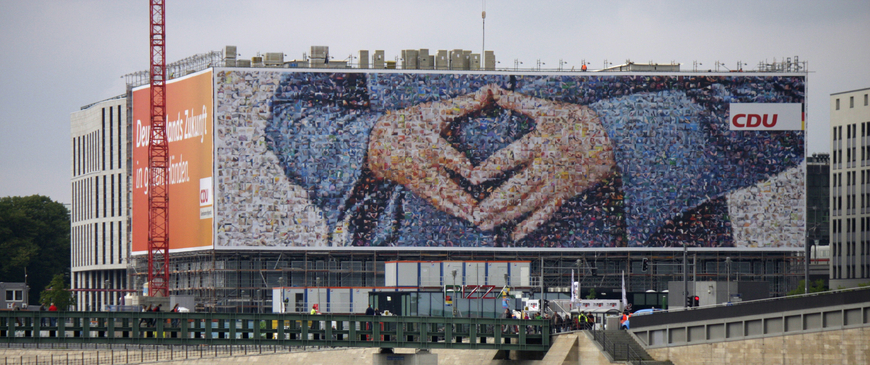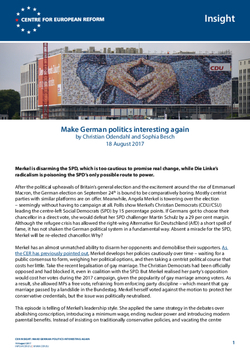
Make German politics interesting again
Merkel is disarming the SPD, which is too cautious to promise real change, while Die Linke’s radicalism is poisoning the SPD’s only possible route to power.
After the political upheavals of Britain’s general election and the excitement around the rise of Emmanuel Macron, the German election on September 24th is bound to be comparatively boring. Mostly centrist parties with similar platforms are on offer. Meanwhile, Angela Merkel is towering over the election – seemingly without having to campaign at all. Polls show Merkel’s Christian Democrats (CDU/CSU) leading the centre-left Social Democrats (SPD) by 15 percentage points. If Germans got to choose their chancellor in a direct vote, she would defeat her SPD challenger Martin Schulz by a 29 per cent margin. Although the refugee crisis has allowed the right-wing Alternative für Deutschland (AfD) a short spell of fame, it has not shaken the German political system in a fundamental way. Absent a miracle for the SPD, Merkel will be re-elected chancellor. Why?
Absent a miracle for the German Social Democrats, #Merkel will be re-elected chancellor, why?
Merkel has an almost unmatched ability to disarm her opponents and demobilise their supporters. As the CER has previously pointed out, Merkel develops her policies cautiously over time – waiting for a public consensus to form, weighing her political options, and then taking a centrist political course that costs her little. Take the recent legalisation of gay marriage. The Christian Democrats had been officially opposed and had blocked it, even in coalition with the SPD. But Merkel realised her party’s opposition would cost her votes during the 2017 campaign, given the popularity of gay marriage among voters. As a result, she allowed MPs a free vote, refraining from enforcing party discipline – which meant that gay marriage passed by a landslide in the Bundestag. Merkel herself voted against the motion to protect her conservative credentials, but the issue was politically neutralised.
This episode is telling of Merkel’s leadership style. She applied the same strategy in the debates over abolishing conscription, introducing a minimum wage, ending nuclear power and introducing modern parental benefits. Instead of insisting on traditionally conservative policies, and vacating the centre ground to the SPD or the Greens, she integrates many of their more left-wing policies, such as those on refugees, into a Christian-conservative narrative. This has helped to demobilise opposition voters.
Merkel also knows that as long as she keeps to the centre ground, the arithmetic of German politics favours the CDU/CSU. Her response to the refugee crisis in 2015 alienated some right-wing voters, and contributed to the emergence of the right-wing AfD, but Merkel was willing to take that risk. She was right: the AfD stands to gain voters from all parties at the election, not just the CDU/CSU. This means Merkel’s party will remain the largest party in the Bundestag, even if it loses voters to the right. And if the AfD makes it into parliament, the Christian Democrats will be indispensable for any governing coalition. Merkel’s relatively open stance on refugees has also helped to convince left-leaning and especially young voters that the country is in good hands: an extraordinary 57 per cent of 18-21 year olds prefer the conservative Merkel to Schulz as chancellor.
The SPD has failed to counter the CDU/CSU's strategy of disarmament and demobilisation. Martin Schulz’s brief poll lead at the beginning of the year showed that after 12 years of Merkel as chancellor, there was a desire for change among German voters. As the CER wrote at the time, Schulz, an outsider to Berlin politics, entered the race as a candidate promising to bring change. But the Social Democrats have failed to deliver: their programme struggles to distinguish itself from Merkel’s platform.
#Schulz entered the German election promising to bring change. But the SPD have failed to deliver.
Take, for example, the labour market reforms of the early 2000s, implemented by the SPD’s Gerhard Schröder. The so-called Agenda 2010 continues to take a heavy toll on the SPD’s popularity. Many social-democratic voters still oppose those labour market reforms and welfare cuts. But because the reforms are widely considered to be a major reason for Germany's economic strength, despite evidence to the contrary, the SPD proposes only minor corrections and shies away from proposing a convincing pro-labour alternative.
The SPD also helped introduce an ill-considered constitutional 'debt brake' in 2009, in the aftermath of the financial crisis. This is now undermining public investment in Germany at a time when the government can borrow money for free, and the SPD's platform contains only cautious investment plans. And during the euro crisis, the Social Democrats failed to develop an alternative narrative or solution, and even voted, while in opposition, with the Merkel government. As a result, the SPD's platform is still centrist and close to the CDU/CSU's on Europe.
If the SPD is to reclaim lost ground and mobilise its voters, it needs to be more radically social-democratic. And there is plenty of scope to be bold.
- Germany has one of the largest low-wage sectors in Europe. A whopping 23 per cent work for wages of less than €10.50 an hour (in Sweden, barely 3 per cent do). Instead of a liberalising 'Agenda 2010' along the lines of the Schröder reforms, the SPD should put together a bold new 'Agenda 23 per cent' that aims to halve the number of people on low wages.
- Many Germans, even CDU/CSU voters, are overwhelmingly in favour of more public investment, instead of tax cuts or reducing public debt. Most public investment is done not by the federal government but by municipalities, which labour under a debt burden of €144 billion. The SPD could call for a municipal debt jubilee, with all municipal debt being taken over by the federal government, in return for increased local investment.
- While policies for parents and childcare have improved over the years, there is plenty of scope to help parents, especially single parents, to bring up their children. One area in particular where the CDU/CSU would never follow the SPD, would be to remove the considerable disincentives in the tax code and health insurance system for the second earner in a family to work. But here, too, SPD proposals are cautious and not much different from Merkel's.
For those voters who do want change, the SPD is not offering enough. And even in policy areas where the SPD campaigns on a platform that differs from CDU/CSU policy, the Social Democrats have not succeeded in shaping domestic debate.
An extraordinary 57 % of 18-21 year old Germans prefer conservative #Merkel to #Schulz as chancellor.
Take foreign and security policy: the SPD wants Germany to focus on crisis-prevention, the stabilisation of weak states, economic development and the fight against hunger, climate change and water scarcity. The Social Democrats are committed to strengthening EU defence initiatives, and, in the medium-to-long term, a European army. German Foreign Minister Sigmar Gabriel spoke to the doubts of many when he said that a sensible security policy should not just be “buying tanks, driving defence spending to insane heights and escalating the arms race”. But rather than present an independent vision for future German defence policy, the SPD has become bogged down in criticism of Merkel’s support of NATO’s 2 per cent of GDP spending target; and they have started a petty fight over the CDU/CSU’s alleged kow-towing to the United States.
On dealing with Russia, the SPD advocates more political dialogue and the lifting of sanctions, a position which most Germans support. But the Social Democrats have got caught up in a scandal over Schröder joining the board of the Russian state-controlled oil company Rosneft. Schulz struggled to distance himself and the party from the ex-chancellor’s close relations with the Kremlin and has since faced criticism over his judgment from the right and the left.
Die Linke also helps Merkel win. In both 2005 and 2013, the left-of-centre parties (Die Linke, the Greens and the SPD) had a majority in parliament, but the CDU/CSU still ended up leading 'grand coalition' governments because Die Linke was considered by centrist voters to be unfit for government. At the level of the German states – the Länder – Die Linke has shown that it is capable of governing responsibly. And on domestic issues, most German voters would grudgingly consider Die Linke to be a party of government. On foreign policy, however, the Left continues to prefer ideological purity to pragmatism: It wants to dissolve NATO and scrap Germany’s intelligence services, and it refuses to condemn Russia’s annexation of Crimea. Such views mean that the party remains unelectable for many Germans. This costs the Social Democrats votes, because Martin Schulz cannot credibly rule out a red-red-green coalition under his leadership. Thus many centrist voters turn to Merkel instead.
Die Linke remains unelectable for many Germans, which costs the Social Democrats votes.
Finally, Merkel benefits from the status quo. Germany's economy is doing well, despite the low wages of many workers; the federal government’s fiscal situation is excellent, and public debt is falling; the political situation in Europe's neighbourhood and the world is scary enough that Germans want a trusted and experienced leader (Merkel wins that contest against Schulz hands down); and Germany's population is old (with a median age of almost 47, compared to 38 in the US), so prefers stability over reform. As a result, 49 per cent want the CDU/CSU to lead the next government, and only 38 per cent prefer the SPD.
Schulz might be able to convince some more voters that he is experienced and reliable in the forthcoming TV debates with Merkel. But in order to beat her, the SPD needs a programme that promises real change to stimulate debate and mobilise its voter base; and needs Die Linke to ditch its poisonous stance on foreign policy and focus on its track record as a governing party in the Länder. None of these look like happening.
If Merkel wins again in September, the SPD should not enter another grand coalition. As Merkel’s junior partner, the Social Democrats would once again get bogged down in compromises, instead of developing convincing alternatives. Instead, Germany’s left should use the next four years to do some serious soul-searching, to ensure that the elections in 2021 are, by German standards, a bit more exciting.
Christian Odendahl is chief economist and Sophia Besch is a research fellow at the Centre for European Reform.


Add new comment